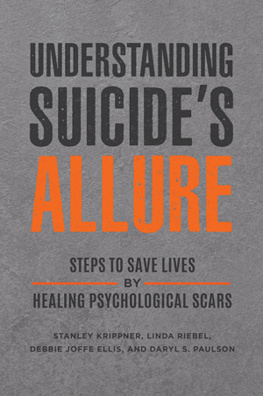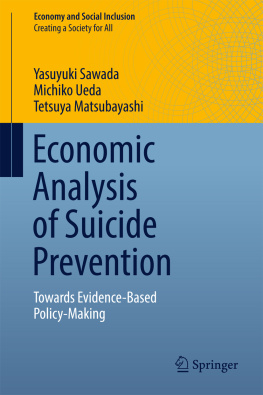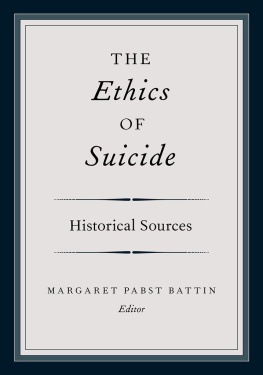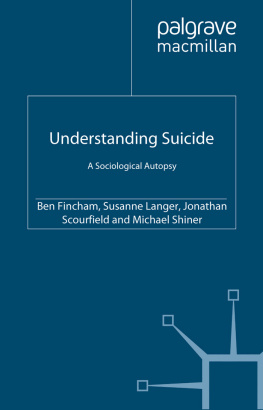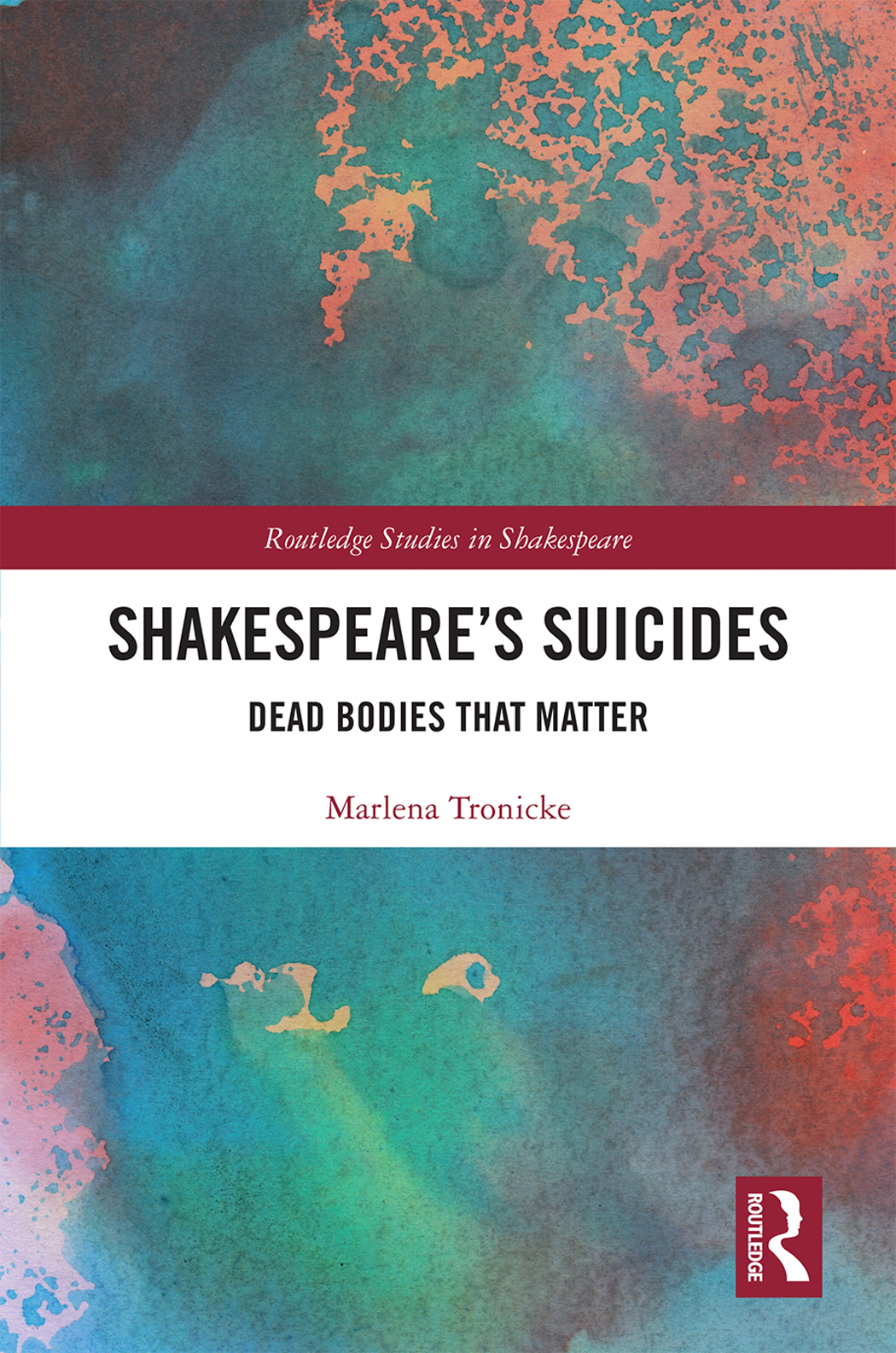Contents
Shakespeares Suicides
Shakespeares Suicides: Dead Bodies That Matter is the first study in Shakespeare criticism to examine the entirety of Shakespeares dramatic suicides. It addresses all plays featuring suicides and near-suicides in chronological order from Titus Andronicus to Antony and Cleopatra, thus establishing that suicide becomes increasingly pronounced as a vital means of dramatic characterisation. In particular, the book approaches suicide as a gendered phenomenon. By taking into account parameters such as onstage versus offstage deaths, suicide speeches or the explicit denial of final words, as well as settings and weapons, the study scrutinises the ways in which Shakespeare appropriates the convention of suicide and subverts traditional notions of masculine versus feminine deaths. It shows to what extent a gendered approach towards suicide opens up a more nuanced understanding of the correlation between gender and Shakespeares genres and how, eventually, through their dramatisation of suicide, the tragedies query normative gender discourse.
Marlena Tronicke is Assistant Professor of English at the University of Mnster, Germany. Apart from Shakespeare and early modern drama in general, her areas of research and teaching include adaptation, Neo-Victorianism, as well as contemporary British theatre.
Routledge Studies in Shakespeare
For a full list of titles in this series, please visit www.routledge.com.
18 Shakespeares Folly
Philosophy, Humanism, Critical Theory
Sam Hall
19 Shakespeares Asian Journeys
Critical Encounters, Cultural Geographies, and the Politics of Travel
Edited by Bi-qi Beatrice Lei, Poonam Trivedi, and Judy Celine Ick
20 Shakespeare, Italy, and Transnational Exchange
Early Modern to the Present
Edited by Enza De Francisci and Chris Stamatakis
21 Shakespeare and Complexity Theory
Claire Hansen
22 Women and Mobility on Shakespeares Stage
Migrant Mothers and Broken Homes
Elizabeth Mazzola
23 Renaissance Ecopolitics from Shakespeare to Bacon
Rethinking Cosmopolis
Elizabeth Gruber
24 Shakespeares Lost Playhouse
Eleven Days at Newington Butts
Laurie Johnson
25 Shakespeares Hamlet in an Era of Textual Exhaustion
Edited By Sonya Freeman Loftis, Allison Kellar, and Lisa Ulevich
26 Shakespeares Suicides
Dead Bodies That Matter
Marlena Tronicke
Shakespeares Suicides
Dead Bodies That Matter
Marlena Tronicke

First published 2018
by Routledge
711 Third Avenue, New York, NY 10017
and by Routledge
2 Park Square, Milton Park, Abingdon, Oxon OX14 4RN
Routledge is an imprint of the Taylor & Francis Group, an informa business
2018 Taylor & Francis
The right of Marlena Tronicke to be identified as author of this work has been asserted by her in accordance with sections 77 and 78 of the Copyright, Designs and Patents Act 1988.
All rights reserved. No part of this book may be reprinted or reproduced or utilised in any form or by any electronic, mechanical, or other means, now known or hereafter invented, including photocopying and recording, or in any information storage or retrieval system, without permission in writing from the publishers.
Trademark notice: Product or corporate names may be trademarks or registered trademarks, and are used only for identification and explanation without intent to infringe.
Library of Congress Cataloging-in-Publication Data
CIP data has been applied for.
ISBN: 978-0-8153-8044-3 (hbk)
ISBN: 978-1-351-21319-6 (ebk)
Typeset in Sabon
by codeMantra
During the past five years, I have learnt that writing a book is much less of a solitary experience than I expected it to be, and I am much obliged to a number of people who have been generous with their time and intellect. Since this monograph started out as a PhD thesis at the University of Mnster, I first and foremost thank my supervisors Klaus Stierstorfer and Florian Klger for their invaluable insight, guidance, as well as continued confidence in me and my work. I am furthermore greatly indebted to Franziska Quabeck, who never tired of discussing my ideas with me and without whose advice and encouragement this endeavour probably would have been less successful, but most definitely less enjoyable. To Laura Schmitz-Justen I am immensely grateful for volunteering to read and discuss the individual chapters multiple times and in various stages, and Rainer Gocke I need to thank for his meticulous proofreading. In place of the many more wonderful teachers, colleagues, and students who shared their knowledge with me and from whose suggestions I have benefitted I would also like to mention Anna Thiemann, who encouraged me not to take the easy way out on the final laps especially. Special thanks also go to the anonymous readers for their constructive and judicious comments as well as to the excellent editorial team at Routledge. Last but not least, I owe a great debt to my parents, family, and friends, without whose love and support I would not have come this far.
Individual passages of the chapter Knitting the Cord: Titus Andronicus appeared as The Pain of Others: Silencing Lavinia in Titus Andronicus in Shakespeare Seminar Online 13 (2015), a journal published under the auspices of the German Shakespeare Society. They are re-published here by permission.
Contents
Throughout, quotations from Shakespeares works are given parenthetically. Unless indicated otherwise, all such references are to The Arden Shakespeare Complete Works, ed. Richard Proudfoot, Ann Thompson, and David Scott Kastan, rev. ed. (London: Arden Shakespeare, 2002). Wherever I have consulted different editions, either for editorial notes or textual differences, these are specified in a separate note.
| Ado | Much Ado About Nothing |
| AWW | Alls Well That Ends Well |
| AYL | As You Like It |
| Cor. | Coriolanus |
| Cym. | Cymbeline |
| Jn. | King John |
| Luc. | The Rape of Lucrece |
| MND | A Midsummer Nights Dream |
| Oth. | Othello |
| Tim. | Timon of Athens |
| TNK | The Two Noble Kinsmen |
| Tro. | Troilus and Cressida |
That suicide is a pre-eminent concern of Shakespeares tragedies hardly needs to be argued. Hamlets To be, or not to be soliloquy, probably the most famous line in literature, is a speech weighing the pros and cons of committing suicide. And suicide also seals the fate of historys most iconic pair of lovers, Romeo and Juliet. In each of the tragedies, most notably in the Roman plays, the stage is virtually littered with the bodies of suicides.


